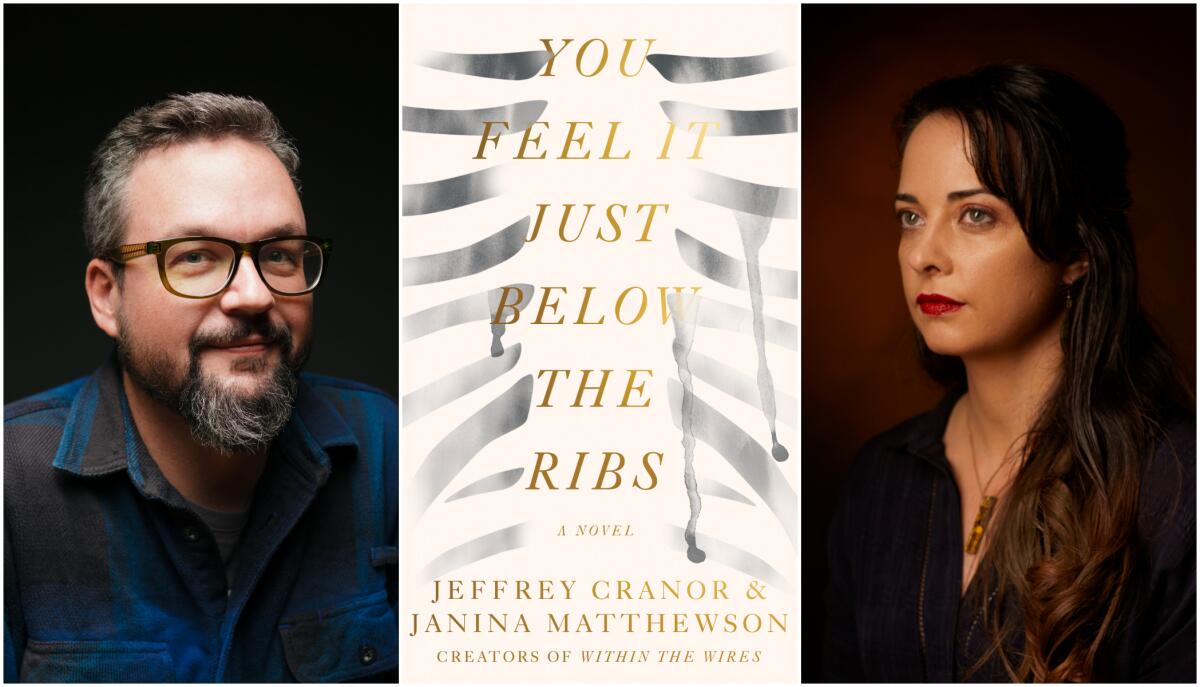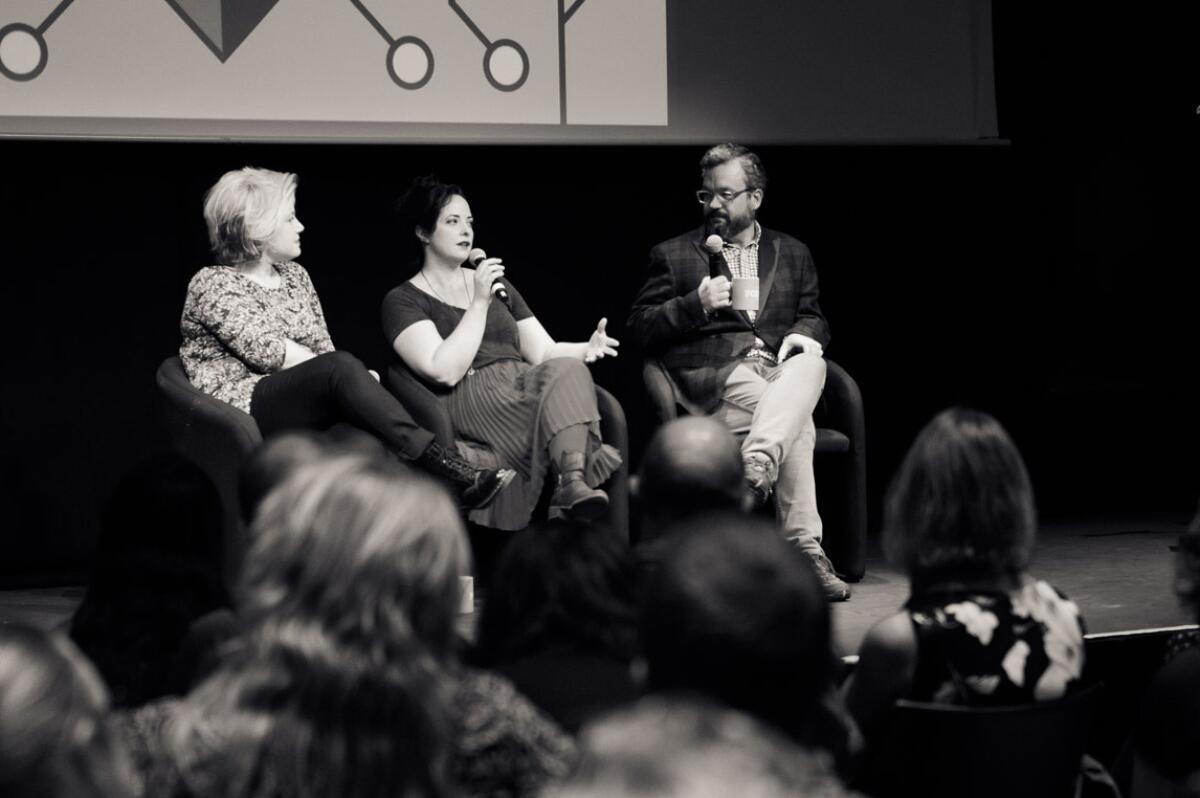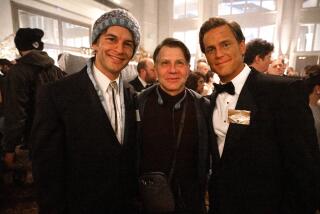How a fiction podcast empire spawned a deeply weird dystopian novel

On the Shelf
You Feel It Just Below the Ribs
By Jeffrey Cranor and Janina Matthewson
Harper: 384 pages, $17
If you buy books linked on our site, The Times may earn a commission from Bookshop.org, whose fees support independent bookstores.
Jeffrey Cranor is in Saugerties, N.Y., Janina Matthewson in “southeast London, the best part of the city.” I’m in Virginia, and the three of us are speaking via videoconference with black microphones close by. My mic might be window dressing, but theirs are essential equipment. From their distant outposts, Cranor and Matthewson write, produce and perform “Within the Wires,” an unusual epistolary podcast that has just spawned their first standalone novel, “You Feel It Just Below the Ribs.” It’s a little like “The Handmaid’s Tale” on acid, but comic and metatextual, constantly destabilizing its own version of truth.
OK, wait. Stop and rewind. To understand the novel, you have to know a bit about Cranor, who doesn’t make it easy. Online, you’ll find a lot about “Welcome to Night Vale,” his extremely successful fiction podcast with co-creator Joseph Fink, which boasts more than 5 million downloads per month. There’s also a bit about collaborations with his wife, dancer/choreographer Jillian Sweeney — but little else. Cranor blames his work in experimental theater, “which hardly leaves a footprint anywhere, although it was the best training for telling stories in an agile way.”
“Welcome to Night Vale” launched in 2012, has continued for 10 seasons and spun off three novels by Cranor and Fink. What is Night Vale, you ask? As Fink has said in interviews, “We came up with this idea of a town in [the Southwest] desert where all conspiracy theories were real, and we would just go from there with that understood.” But Night Vale is also, by now, a sprawling multimedia universe. Among the products of Night Vale Presents is a touring version of the podcast narrated by Cecil Gershwin Palmer (played by Cecil Baldwin). Imagine Garrison Keillor’s “Prairie Home Companion” but much trippier and funnier.
If Cranor is the mastermind of this multiverse, Matthewson is the fan-turned-collaborator. She grew up and trained as an actress in Christchurch, New Zealand, before moving to London and publishing two works of fiction, “The Understanding of Women” in 2012 and “Of Things Gone Astray” in 2014. Her partner got her hooked on “Night Vale.” When Cranor tweeted a photo of her last book with a handcrafted Night Vale bookmark in it, she thanked him on Twitter. He sent her a DM and — fast-forward now — “Within the Wires” is in its fifth season.
“I love Twitter for that reason,” Cranor says. “It’s such a great way of meeting people, and it’s kind of like how I find my books. You see a title on a table at a bookstore, and you take a look at the first couple of pages, and think, oh, this is really good!” Matthewson chimes in: “Sometimes it sparks a deeper conversation, especially if you’re in the same business.”
A sentient Glow Cloud hovers in a sky filled with surveillance helicopters.
The last thing you need to know before understanding “You Feel It Just Below the Ribs” is how “Within the Wires” came to be. It goes back to a 2013 show Cranor and his wife produced at St. Mark’s Church in-the-Bowery, a prominent avant-garde performance space in Manhattan. “One piece had a rhythmic pattern between four dancers, and we accompanied it with a droning relaxation guide. I got into listening to those tapes, not for actual relaxation, but for their patter. I thought: How could you tell a story through these?”
Matthewson was intrigued when Cranor floated the epistolary concept — and sold when he added, “I’m not particularly interested in telling a story that centers around men.”
“That’s where we started from with the whole thing,” she says. “Podcasting is still such a young medium, relatively, and it’s still experimental, making it a great place to play with weird stuff and do what you want to do. It’s raw and interesting and still a little bit wild.”

Which brings us to the plot of “Within the Wires,” such as it is. In their alternate history, the 20th century culminated in a “Great Reckoning,” a terrible global conflict — never fully explained — which left the world and its people with war-torn landscapes and broken supply chains. But that’s just the background, the storyboard, in a podcast where the world-building happens as you go.
Coming in under the Night Vale umbrella meant having the security to tell a really weird story. “We didn’t have a lot of pressure about keeping an audience,” says Cranor. “They were ready to trust us.”
Matthewson adds, “Jeffrey and I have a similar attitude to our work, which is that we would love for you to come and enjoy it. But if you don’t, then we’re not going to lose sleep over it. That’s what all art is.”
“You Feel It Just Below the Ribs” builds on the podcast’s world. The novel follows Dr. Miriam Gregory, who lived through the Great Reckoning and its aftermath. “There’s definitely a dystopian element to it, as well as a utopian one — but both have aspects of harm,” says Cranor. “I think that is one universal truth, that you can’t have protection without some form of harm.”
Lydia Millet, whose latest novel, “A Children’s Bible,” tackled climate change, reads new fiction on climate and argues against calling it a genre.
Dr. Gregory lives in a world in which children are legally taken from their parents just after birth and raised communally until age 10, when they are sent to various educational facilities. Having learned just after the Great Reckoning about a mind-control exercise she calls “the Watercolor Quiet,” Dr. Gregory is hired by an institution to use it on children who have experienced trauma. The outcome galvanizes her to set down her story, piecemeal, in the hope that it will lead to lasting change.
The authors agree that their world-building came from the characters first. As for the alternate history around them, plenty of things are left unspecified — which is not to say the authors don’t know them. “I think it’s a fun way of taking the reader and jolting them a bit from their preconceived notions of history,” says Cranor. At the start of the project, Matthewson created a detailed timeline that included everything from “major worldwide legislation down to when a certain character was born.”
The timeline became a road map, says Matthewson. “You can get a sense of what might come next, because we know how humanity works. No matter what the system of government is, there’s always going to be corruption. There’s always going to be a hawkish sector. There’s good and bad within all of us.”
That includes, Cranor points out, the novel’s mysterious meta-narrator, who bookends Dr. Gregory’s manuscript with cryptic, sometimes withering comments. “One read is that the narrator is a propagandist, but another read might be that the narrator is a critical thinker. We’re in a time where it’s really important for us to consider how we consume information.”
Because we’re at the end of history? Matthewson laughs. “We always think we’re at the end of history. It’s really the limits of human imagination. It’s hard for us to imagine advancement too far beyond what we’ve got at any given point. Given our human limitations, we decided telling the story of one individual’s experience was the best way of explaining bigger truths. When you tell a story that is essentially someone’s whole life, you can’t avoid despair. But you also can’t avoid hope.”
Coming in November: Sam Quinones, Ann Patchett, Emily Ratajkowski, Nikole Hannah-Jones, Gary Shteyngart, Natashia Deón — and the list goes on.
Patrick is a freelance critic who tweets @TheBookMaven.
More to Read
Sign up for our Book Club newsletter
Get the latest news, events and more from the Los Angeles Times Book Club, and help us get L.A. reading and talking.
You may occasionally receive promotional content from the Los Angeles Times.








